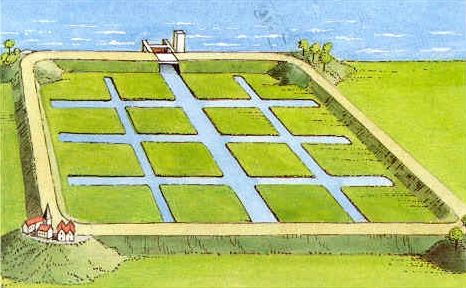Enhancing the applicability of the polder concept
by Eelco van der Pal
Delta areas are attractive areas to live in. They are valuable due to their major economic potential as well as their large environmental values. However, due to ongoing urbanization, demand for space is still increasing and since delta areas are low-lying, they are vulnerable to flooding. Polders provide opportunities for further developing these delta areas, either by improving existing areas, or by establishing a new living environment. At the same time, polders have their limitations. This research aims at finding possibilities to enhance the application of the polder concept, leading to business opportunities for the different sectors in the Netherlands (government, business sector and knowledge institutes).

In this research, a polder is defined as a level area which has originally been subject, permanently or seasonally, to a high water level (groundwater or surface water) and is separated from the surrounding hydrological regime to be able to control the water levels in the polder (groundwater and surface water). The research focuses on increasing safety, sustainability and flexibility in future polder settings. Based on an analysis of the Strengths, Weaknesses, Opportunities and Threats (SWOT analysis) it is shown that there are definite opportunities for developing polders in the future.
An important strength of the polder concept is the economic aspect. The concept allows applying a flexible design; the construction may be carried out in different phases leading to financial advantages. Moreover, the construction costs of a polder are in most cases (depending on the size and availability of fill material) much less compared with a traditional land reclamation. Weaknesses of the polder concept relate to the operation and maintenance requirements and costs. Polders require a long-term operation and maintenance (O&M) commitment in order to sustain. Due to subsidence and sea level rise, a decrease in safety levels will occur. An opportunity for applying the concept abroad relates to the ongoing urbanization of delta areas and the development in flood prone areas. A threat for applying the concept abroad relates to local governance and administrative weakness. Another threat is the vulnerability of the concept to climate change leading to a discussion on safety.
It may be concluded that in the future, the focus should be on urban polders since most development potential can be found in urban delta areas. Urban areas that have an elevation at approximately sea level are getting more prone to flooding due to ongoing subsidence and sea level rise. The most important boundary condition for successful polder development is the presence of the right institutional setting. A qualified and preferably non-political entity (public, private) should be present in order to guarantee the long-term commitment for operation and maintenance. Another important boundary condition, related to the construction and operation and maintenance, is that sufficient financial resources should be available in order to sustain the polder.
Possibilities for future business development for knowledge institutes relate to the application and further development of Dutch innovations such as the “Building with Nature” concept, application of smart dikes and prevention of subsidence. Governmental institutions, such as water boards, drinking water companies and municipalities, can be involved in the polder development process by assisting in the set up of an administrative body. The Dutch governmental institutions can also demonstrate their excellent experience with organizing the operation and maintenance in polder settings.
Graduation committee:
- N.C. van de Giesen
- O.A.C. Hoes
- R.J. Verheaghe
- T.A. Nauta
- S.A.M. Karstens